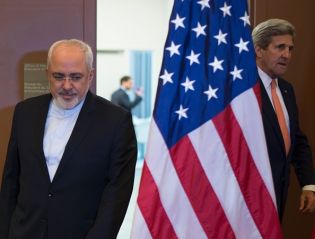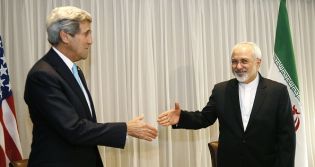
(CNSNews.com) – Iran’s globe-trotting foreign minister, Javad Zarif, will be designated for U.S. sanctions later this week, Treasury Secretary Steven Mnuchin said at the White House on Monday.
“The president has also designated – instructed me that we will be designating Zarif later this week,” he told reporters, while discussing the latest sanctions developments.
President Trump earlier Monday issued an executive order targeting supreme leader Ayatollah Ali Khamenei and his office, and Mnuchin then announced sanctions against eight senior Islamic Revolutionary Guard Corps (IRGC) commanders.
There was no immediate reaction from Zarif to the news. An Iranian lawmaker said that in a meeting Monday Zarif said that Iran was standing firm against U.S. sanctions and threats “with full power,” and would continue doing so. In a speech Monday, Zarif complained that U.S. sanctions were harming Iran’s efforts to fight illicit drug trafficking.
Zarif is a high-profile figure, widely and often warmly received in world capitals. He is active on social media, regularly using his Twitter feed to respond to U.S. policies and to push his talking point that a so-called “B team” of U.S. officials and allies are goading Trump into a war with Iran. (The regime blocks access to Twitter to Iranian citizens.)
Veteran Iran-watchers in Washington expressed the hope that sanctions against Zarif would be accompanied by information that illuminates his involvement in malign regime behavior – and so challenges the notion that he is a “moderate.”
Foundation for Defense of Democracies (FDD) senior vice president Jonathan Schanzer, a former Treasury Department terror finance analyst, said he was keen to see the Treasury document that accompanies Zarif’s designation.
“These are derived from declassified intelligence,” he tweeted. “If done right, the statement could severely puncture the hardliners vs narrative that has been parroted by regime shills for a decade.”
Schanzer added that if the intelligence “supports the case that Zarif is himself involved in the regime’s malign activities, it could be a game changer for the debate in DC.”
“If administration does sanction Zarif, they should make it clear that he’s responsible accountable for decisions made by regime to conduct malign destructive activities,” tweeted FDD executive director Mark Dubowitz.
“No more mendaciously denying responsibility. He is part of regime in Iran core regime decision-making.”
Dubowitz noted that Zarif is a member of the regime’s Supreme National Security Council and as such is a party to the regime’s major foreign policy and national security decisions.
“He should be sanctioned for his role in the regime’s malign conflict. He’s part of the system. He is loyal. He didn’t go to Mugniyah’s funeral because he wanted to see the Cedars. He whitewashes murder and terrorism all the time. He is Khamenei’s man.”
(Hezbollah arch-terrorist Imad Mugniyah, an FBI “most wanted” terrorist accused of masterminding numerous deadly attacks, was killed in a 2008 bomb blast in Damascus which Hezbollah and Iran blamed on Israel and the CIA. Since his death Zarif has paid his respects more than once, visiting his tomb while visiting Lebanon. Asked about honoring the dead terrorist, Zarif told NBC News in 2015 that Hezbollah fighters “are considered heroes in the entire Middle East.”)

‘Polished front men’
Zarif was then-Secretary of State John Kerry’s opposite in the drawn-out negotiations that produced the Joint Comprehensive Plan of Action (JCPOA) nuclear deal in 2016.
The two men developed a close working relationship during the talks, meeting and speaking by phone frequently.
Kerry characterized Zarif as a moderate in a difficult political setting. Describing that environment in one Oct. 2016 speech, Kerry said, “There are people in Iran who want a different Iran, an Iran that reaches out to the world, an Iran that’s engaged with people, an Iran that can re-enter the global community with respect and with acceptance.”
Arrayed against them were the hardliners, he added, “who fight that every step of the way.”
Days later, Kerry praised Zarif as “a patriot.” Last fall he confirmed having met with the Iranian several times since leaving the State Department – although not, he said, since Trump withdrew from the JCPOA in May of last year.
Trump administration officials disputed its predecessor’s portrayal of Zarif and President Hassan Rouhani as moderates.
“The regime’s revolutionary goals and willingness to commit violent acts hasn’t produced anyone to lead Iran that can be remoted called a moderate, or a statesman,” Secretary of State Mike Pompeo in a speech last summer.
“Some believe that President Rouhani and Foreign Minister Zarif fit that bill,” he said. “The truth is they’re merely polished front men for the ayatollah’s international con-artistry.”
Source material can be found at this site.









